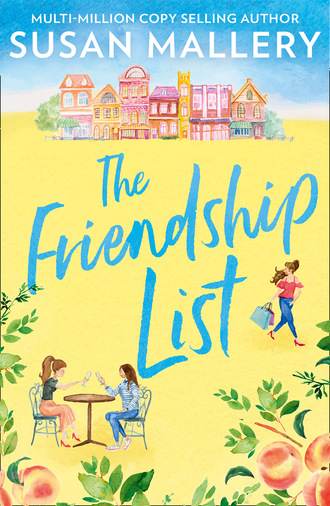
The Friendship List
Not exactly the word she would have chosen, but then she didn’t spend much time in the jock/jockette world.
“You’re a leader, so he expects better of you.”
More tears filled Luka’s eyes. Next to him, Coop winced.
“What if I can’t get an A?”
“You won’t with that attitude.”
Luka sniffed. “That’s what Coach said.”
Cooper leaned close. “It’s a teacher thing. They think alike. Welcome to my world.”
She did her best not to smile. Her boys, she thought fondly. Cooper and his friends had been running in and out of her life since he’d been old enough to invite kids back to play. Luka had been a staple in her life for nearly a decade. He and his family had moved here from Yap (a tiny island in Micronesia—she’d had to look it up). Luka and Coop had met the first day of second grade and been best friends ever since.
“Luka, I forbid you to think about this anymore today. Your mom is waiting for you. Go have a nice dinner and relax this evening. Tomorrow, get your butt in gear and get going on the Spanish studies.” She hesitated. “I’ll talk to Coach and make sure you’re still on the college trip.”
His dark eyes brightened. “You will? Thanks, Ms. F. That would be great.”
Before she could step back, Luka grabbed her and lifted her up in the air. It was not a comfortable feeling, but all of Coop’s friends seemed to do it. He swung her around twice before setting her down. Both teens headed for the door.
“I’ll be back by ten,” Coop yelled over his shoulder.
“Have fun.”
Ellen gave herself a little shake to make sure nothing had been crushed, then stepped out on her small deck to check out the heat level. The front of the house faced south, leaving the backyard in shade in the early evening. The temperature was close to eighty, but bearable.
The deck overlooked a small patch of lawn edged by fencing. Nothing fancy, but it was hers and she loved it. She quickly wiped off the metal table and dusted the chairs before putting out placemats, plenty of paper napkins and a cut-up lime. She’d already made a green salad to counteract the calories from the fried chicken. Shortly after six, she heard a knock on the front door, followed by a familiar voice calling, “It’s me.”
“In the kitchen,” she yelled as she opened the refrigerator and pulled out two bottles of beer. Dos Equis for him and a Corona for herself. She glared when she saw the extra to-go container in his hand.
“What?” she demanded. “We agreed on chicken.”
He held up the KFC bucket. “I brought chicken. Original, because you like it.”
“Don’t distract me. Are those potatoes? I can’t eat those.”
“Actually you can. I’ve seen you. You have no trouble using a fork.”
She set his beer on the table. “Do you know how many calories are in those mashed potatoes? I’m not some macho athletic guy.”
Keith gave her an unapologetic smile. “I’d still be friends with you if you were.” He set down the food. “Stop worrying about it. You look fine.” He glanced at her. “As far as anyone can tell.”
She ignored that and refused to look down at her oversize tunic and baggy pants. “I like to be comfortable. Loose clothing allows me to move freely on the job.” She ducked back into the house to get the salad, then joined him at the table.
He’d already taken his usual seat and opened both to-go containers. The smell of fried chicken reminded her she hadn’t eaten since lunch, which felt like two days ago. Her stomach growled and her mouth watered.
Keith put a chicken breast on her plate, then handed her the mashed potatoes. She put slices of lime in both their beers. Their movements were familiar. Comfortable.
Coach Keith Kinne and his daughter had moved to Willowbrook five years ago. He’d joined the faculty of Birchly High as the football coach and athletic director. Washington State might not have the religious fever of Texas when it came to high school football, but there was still a lot of enthusiasm and the six-foot-two-inch, good-looking, dark-haired former NFL player had caught a lot of ladies’ attention.
Not hers, though. Mostly because she didn’t date—there wasn’t time and no one she met was ever that interesting. So when she’d found him cornered by a slightly aggressive novice teacher from the English department, Ellen had stepped in to save him and their friendship had been born. They hung out together because it was easy and they complemented each other. He’d helped her when she’d bought a new-to-her car a couple of years ago and she went Christmas shopping with him for his daughter.
“Why are you smiling?” he asked, picking up his beer.
“Just thinking that it’s nice we’re friends. Imagine how awkward things would have been if I’d gone after you when you first moved here.”
He frowned. “Don’t say that. If you had, we might not be friends now. I was fresh off a divorce and I wasn’t looking for trouble.”
“I’m not trouble.”
“You would have been if we’d dated.”
What on earth did he mean? “Trouble how?”
“You know. Boy-girl trouble.” He put down his beer. “Speaking of dating, Lissa got on me about my internet relationships.”
“You don’t have internet relationships. You find women to have sex with.”
He winced. “That’s what she said. Have you two been talking about me behind my back?”
“Oh, please. We have so many more interesting things to talk about.” She’d never understood the appeal of casual sex. It seemed so impersonal. Shouldn’t that level of intimacy be part of a relationship? Otherwise sex was just as romantic as passing gas.
“She told me to find someone I wasn’t embarrassed by so she could meet her.”
“That’s nice.”
“It freaked me out.”
Ellen grinned. “That’s because there are emotions attached to relationships and you don’t like emotions.”
“I like some of them. I like winning.”
“Winning isn’t an emotion.”
“Fine. I like how winning makes me feel.” His expression turned smug. “I get emotions.”
“You’re faking it.” She let her smile fade. “Cooper wants to go to UCLA.”
“Are you sure? He told me Stanford.”
She heard a ringing in her ears as her whole world tilted. “W-what? Stanford? No. He can’t.”
“Why not? They have a better wrestling program. I’ve spoken to the coach there and he’s really interested. I’m working on getting Coop a one-on-one meeting when we visit the school. With his skills and grades, he’s got a good shot at getting in.”
“I’m going to faint.”
“Why? You should be happy.”
She glared at him. “Happy? Are you insane? I can’t afford UCLA and it’s a state school. How on earth would I pay for Stanford? Plus, why isn’t Cooper telling me about things like meeting a coach? I should know that.”
“Breathe,” Keith told her. “If he goes to Stanford, you’ll be fine. With what you make, his tuition will be covered. If he gets a partial scholarship, it could go toward room and board. Stanford would be a lot cheaper for you than UCLA.”
Her panic faded. “Are you sure?”
He looked at her. “You have to ask me that?”
“Sorry. Of course you’re sure. You do this all the time.” She picked up her chicken. “Yay, Stanford. Go team.”
“You don’t have any contact with his dad, do you? Because his income would count.”
“No contact,” she said cheerfully. “Jeremy disappeared before Coop was born. I hear from him every five or six years for five seconds and then he’s gone again. He signed his rights away and he’s never given me a penny.” She smiled. “I say that without bitterness because I’m loving the Stanford dream.”
Keith grinned. “You’re saying you can be bought for the price of tuition?”
She smiled back at him. “I can be bought for a whole lot less than that. So why didn’t he tell me about wanting to go to Stanford? Why is he keeping secrets?”
“He’s becoming a man. He needs his own dreams and plans.”
“But I’m his mom and he’s my baby boy. Make him stop growing up.”
“Sorry. Not my superpower.”
She remembered what it had been like when Coop had been younger. It had been the two of them against the world. “I miss being the most important person in his life, but you’re right. He needs to make his own way. What are the Stanford colors? Will they look good on me?”
Two
Keith reached for his beer, not bothering to hide his amusement. “Is that going to be part of the decision-making process? How you look in the college colors? Because you care so much about how you look?”
“Hey!” Ellen balled up her napkin and tossed it at him. “I care. Sort of.”
Keith had been around women enough to know this was not a winning line of conversation. When it came to pretty much everything, women had rules men couldn’t possibly understand. He’d often thought that if Ellen put even five minutes into her appearance, she would be chasing men off with a stick. Yet if he mentioned that, he was the bad guy.
Like her clothes. They were always at least two sizes too big. Even when she wasn’t teaching, she wore baggy jeans and oversize T-shirts or sweatshirts. She never put on makeup. Despite having long, wavy dark hair, she never wore it other than in a ponytail or a braid.
Not his rock, he reminded himself. Ellen was his friend and whatever made her happy made him happy, too.
“I’m sure the Stanford colors will be glorious on you,” he told her.
She rolled her eyes. “Glorious? Is that the best you could come up with?”
“It is.”
“Fine. Tell me about your day.”
He reached for a chicken leg and put it on his plate, then added two more. “I had to deal with another pregnant girl. Why does this keep happening and why do they come to me?”
“In reverse order, they come to you because you’re capable and the odds of the guy involved being an athlete are high. As for why they get pregnant, that’s easy. Men don’t control their sperm.”
He stared at her. “What?”
“Sperm. It’s not the sex that’s the problem.” She waved her beer bottle. “Think about it. Women can have sex all day long and not get pregnant. They can have orgasm after orgasm and nada. It’s all about ejaculation. If the male half of the species made sure that didn’t happen inside women, there would be no unplanned pregnancies. Everyone looks to the girl, but she’s not the one who made it happen. He did.”
Despite the hell that had been his day, Keith chuckled. “You always have a unique perspective.”
“I know. What was it you said? I’m glorious.”
“You are. So if you’re right, then the system is rigged against women, but that doesn’t change the pregnancy outcome.”
Her expression turned sympathetic. “You worry about Lissa too much.”
“Do I? As you just pointed out, she’s one wayward ejaculation away from getting pregnant.”
“She’s on the pill.”
“If she takes them.”
Ellen put her hand on his forearm. “Your daughter doesn’t want to get pregnant, Keith. She’s a smart girl and she’s on birth control. Plus, from what I can tell, she’s not seeing anyone. You know how she gets—once she likes a guy, that’s all she ever talks about. On the boy-girl front, things have been quiet.”
“I hope you’re right. The whole situation makes me crazy.” Lissa was his daughter, his world. He wanted to do everything in his power to make her life perfect.
Ellen reached for the mashed potatoes. “When we’re back from the college bus trip, Lissa and I will be working at the fruit stand for the rest of the summer. I’ll find out what’s going on. Between now and then, she’s busy with school, then she’ll be with you on the bus. She should be perfectly safe. And speaking of the bus trip, I think we’re pretty much done with the details. What do you think?”
“I agree. I’m buying the Disneyland tickets this week,” he said. “The hotel reservations are all made.”
“You’re a good man for doing this.”
He raised one shoulder. “I don’t mind it.”
Since moving to Willowbrook, he’d started taking a group of his athletes on a tour of West Coast colleges. The students spent the school year raising money to pay for gas, hotels rooms and food. Keith made appointments with the various colleges the students were interested in. The trips were about two weeks long, with a few fun stops along the way. This year’s students had decided they wanted to spend an afternoon on the beach in Santa Monica, a day in Disneyland and a day at the Monterey Bay Aquarium. They’d raised enough money and Keith always let them plan the agenda. They would visit a half dozen colleges, see the West Coast and, for many of his students, leave the state for the first time.
“You excited about the trip?” he asked.
Ellen smiled at him. “Excited is strong, but I’m happy to be the bus mom.”
It would be her first time joining him, but with Coop going, she’d volunteered. He was bringing Lissa.
“Too bad it’s only guys,” he said. “I think Lissa would have liked a couple of girls along.”
He always had more students apply than he could manage. In November, he held a drawing with twelve students chosen at random. This year both of the female students who had won a slot had dropped out.
“She’ll have me,” Ellen said. “Plus Coop’s like her brother. And all the guys are scared of you, so no one will bother her.”
“Damn straight they’re scared of me,” he grumbled. “If I catch any of them with my daughter, I will let my fists do the talking.”
She tsked. “Violence? Is that the best you can come up with?”
“When it comes to Lissa, yes.”
They finished dinner and talked for another hour before he helped her clean up. Close to eight, she walked him to the front door.
“Thanks for listening,” he said, hugging her.
“Thanks for the info on Stanford. I’ll sleep easier tonight knowing I just might be able to pay for college.”
She looked up at him as she spoke. As always, her bangs were too long, almost touching her big eyes. She looked impossibly young—as if there was no way she could have a seventeen-year-old son. Only she’d been Lissa’s age when she’d gotten pregnant.
“You did a great job with your kid,” he told her.
“Thank you. Back at you.”
“Yeah, but I wasn’t still in high school when she was born. And I had a wife.”
“I had my parents.”
“Hey, I’m trying to pay you a compliment here.”
“Sorry.” She smiled. “Thank you, Coach Kinne.”
“You’re welcome, Ms. Fox.”
She laughed. “See you tomorrow.”
“Always.”
He walked toward his extended cab truck. Despite the hour, the sun still hadn’t set. This time of year, there was a ridiculous amount of daylight in the Pacific Northwest.
As he got behind the wheel, he glanced at the duplex where Ellen lived. She’d told him how when her parents had sold their house and moved to Palm Desert to retire, they’d given her enough money for a down payment on a house. She’d impressed them by buying a duplex instead, so she would have steady income to help her pay down the mortgage.
She’d confessed that she would have preferred a single-family home, but she’d known the duplex was the smarter decision. That was Ellen—always sensible and doing the right thing. She was a good friend, one he could depend on. In some ways, not counting Lissa, Ellen was the best relationship he’d ever had.
“Peter, my youngest, called last night,” Howard said, as he checked his toolbox. “His divorce is final. Maybe you’d like to meet him.”
Unity Leandre stared at the big dry-erase board mounted on the wall of her garage. It was divided into five columns, one for each day of the week. The jobs were listed on the day they would be done, with an arrival time next to them. Every morning she went over the jobs with her team and decided who would do what and how long it should take.
“She doesn’t want to go out with Peter,” Jerry said. “He’s what? In his forties?”
“Forty-five.”
“That’s too old for her. How old are you, Unity?”
“Thirty-four.”
“See?” Jerry sounded triumphant. “That’s too big an age difference. Plus Peter lives in Bellingham. The drive would be at least three hours, maybe four.”
“He’s a good guy,” Howard insisted. “An entrepreneur.”
“He owns a yard mowing service.”
“It’s a landscaping company. They’d have a lot in common.”
Jerry snorted. “Leave the girl alone. She’ll find the right guy on her own. She doesn’t need us butting into her business.”
“I’m not butting, I’m offering to help. Unity, am I butting in?”
Unity put Howard’s initials next to the backed-up drain and Jerry’s by the new shower fixture.
Only then did she turn toward the two seventysomething men who worked for her—part-time, of course. Because being retired didn’t mean a person wasn’t busy. Something she’d learned in the past three years. She had a team of five men working for her—all well over the age of sixty-five, all good at their jobs. Sure, there were times when they couldn’t move as fast as someone younger, but they were skilled, careful and thorough. She would rather the job took a little longer, but was done right. Besides, most of her clients were at the Silver Pines retirement community, so they appreciated having handymen of a certain age around. As for Howard’s youngest and his recent divorce, just no.
She smiled. “You’re not butting, Howard, but I’m also not interested.”
“You haven’t met him yet. What if he’s everything you’ve been looking for?”
Unity shook her head. Three-plus years after Stuart’s death, she wasn’t the least bit interested in finding a replacement.
“I’m sure he’s wonderful,” she said kindly. “Just not for me.”
“It’s because he’s too old, right?” Jerry asked hopefully. He turned to Howard. “I told you to stop butting in.”
The two men were fast friends. They both had gray hair, wrinkled faces and slight beer bellies. Howard was a little taller, but still shorter than Unity. She was five-ten and, as more than one of the old ladies at the retirement community had remarked, a strapping girl. Broad-shouldered and sturdy. In high school she’d been on the swim team and had almost made it to the state championships. These days her exercise program came with her job. There was plenty of bending, lifting, dragging and reaching. Maybe she wasn’t the media’s idea of a beauty, but she didn’t care. Stuart had thought she was pretty and that was enough for her.
She wrote down the addresses of the jobs on two pieces of paper and handed them to the guys. “Keep track of your hours and parts, please,” she told them. “I’m heading over to help Dagmar this morning. You can reach me on my phone if you need me.”
Jerry shook the note. “If you got a real phone, you could text us the address. And you could get one of those apps to keep track of our hours and the parts we use. Paper is so last century.”
Howard rolled his eyes. “He has an e-reader, so he thinks he’s all that.”
“I love my flip phone.” Unity patted her jeans pocket. “It’s dependable and the battery charge lasts forever.”
“That’s because your phone doesn’t do anything,” Jerry grumbled. “Embrace technology. By the time we die, you’ll be replacing us with robots.”
“Not likely.” Unity smiled at them. “And please don’t die.”
“It’s gonna happen eventually,” Howard said cheerfully. “See you later, Unity.”
The guys left, speaking for a minute on the sidewalk before heading for their cars. Unity confirmed that she’d listened to all the messages left on the answering machine, then scanned her date book to make sure the current week’s work had been transferred to the dry-erase board. Old-school, she thought. But simple and dependable. She wasn’t really a technology kind of person.
After closing the garage door, she walked through the house to double-check the back door. She paused in the hall, by the wedding picture taken the week after she’d graduated from high school. She and Stuart had been so young, she thought wistfully, touching the glass protecting the photograph. But they’d been in love and so sure they would be together forever.
The familiar sadness was pushed aside for a moment when she caught sight of the tiny glass beads on her wedding dress. There were hundreds of them, all sewn by hand. She should know—she and Ellen had spent dozens of hours carefully adding the beads to the inexpensive dress that had been all Unity could afford. She’d wanted the beautifully beaded dress, but it had been double her budget. She’d placed the order for the cheaper one, but had left the store in tears.
The next day Ellen had dropped a small, heavy box on Unity’s bed. Inside had been little plastic bags filled with beautiful, iridescent glass beads.
“It’ll take us right up until the wedding,” Ellen had told her. “But you’re going to have the perfect dress when you marry Stuart.”
It was an Ellen kind of thing to do, Unity thought. She believed in showing her love rather than just talking about it. From April until the end of June that year, Ellen had demonstrated her affection with hours of beading, and in the end, Unity had married Stuart...all the while wearing the dress of her dreams.
Her gaze shifted to her late husband’s face, remembering everything about that day. They’d been so thrilled to get married. It had been a magical day, but not the best day. With him, there hadn’t been a best day—there couldn’t be. They were all too good.
And thoughts like that were not helpful, she reminded herself, as the ache of missing him returned. Dagmar was waiting and Dagmar wasn’t the type to take lateness in stride.
Unity drove the three miles to The Village at Silver Pines, otherwise known as just plain Silver Pines, and was waved in by the guard at the gate.
Silver Pines was the largest retirement community in the Pacific Northwest. There were single-family homes, condos, a golf course, several clubhouses, three restaurants, a workout facility, two pools, tennis and pickleball courts, and a grocery store. Deeper into the multi-acre complex were the independent living apartments, assisted living apartments, memory care and rehab facilities, a skilled nursing home and an outpatient surgery center.
The community hosted weekly garage sales, movie nights and all kinds of clubs. The senior center—housed in the largest of the clubhouses—was open to the public.
Unity had discovered it and Silver Pines when she’d first moved back, three years ago. She’d decided to take up knitting, and the senior center had offered a class. She’d enjoyed the company so much, she’d joined the local pickleball league and was a regular at various events. Now, with the exception of Ellen, all her friends were over the age of sixty-five.
She drove through quiet, well-maintained streets. The association took care of all front lawns—freeing the residents from worry. Unity smiled. Maybe Howard should tell his son about the work his lawn business could have here. Not that she was interested. Too many of her friends were trying to fix her up. They liked Unity and wanted to see her “happy.” When she tried to tell them it had been only three years and she was nowhere near over Stuart, they told her she shouldn’t wallow. As if she had a choice about the amount of grief in her life. She also tried explaining that she’d had one great marriage and didn’t need another one, but that didn’t work either. Only Ellen let her be.
Unity turned onto a side street, then another, before pulling in front of a small rambler. The house was two bedrooms and two baths—about twelve hundred square feet. Sadly, Betty had fallen the previous week and broken her hip and would be moving into an independent living apartment.
Betty’s soon-to-be former house, like all the other houses, was on a single level with no stairs. The path from the street to the dark blue front door had a gentle incline. There were no steps anywhere in the house. The doorways were wide enough to accommodate a wheelchair. Inside the finishes were upscale. There were several floor plans and this was one of Unity’s favorites.









